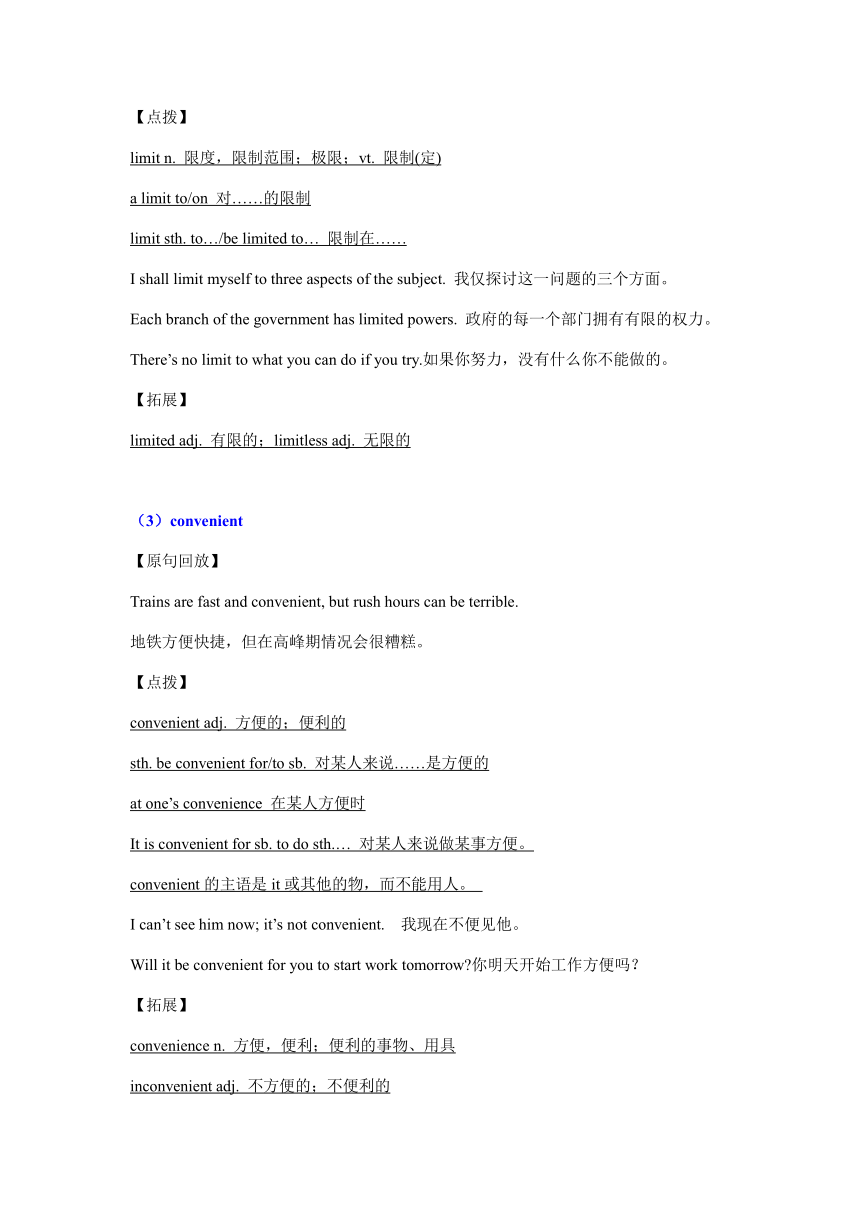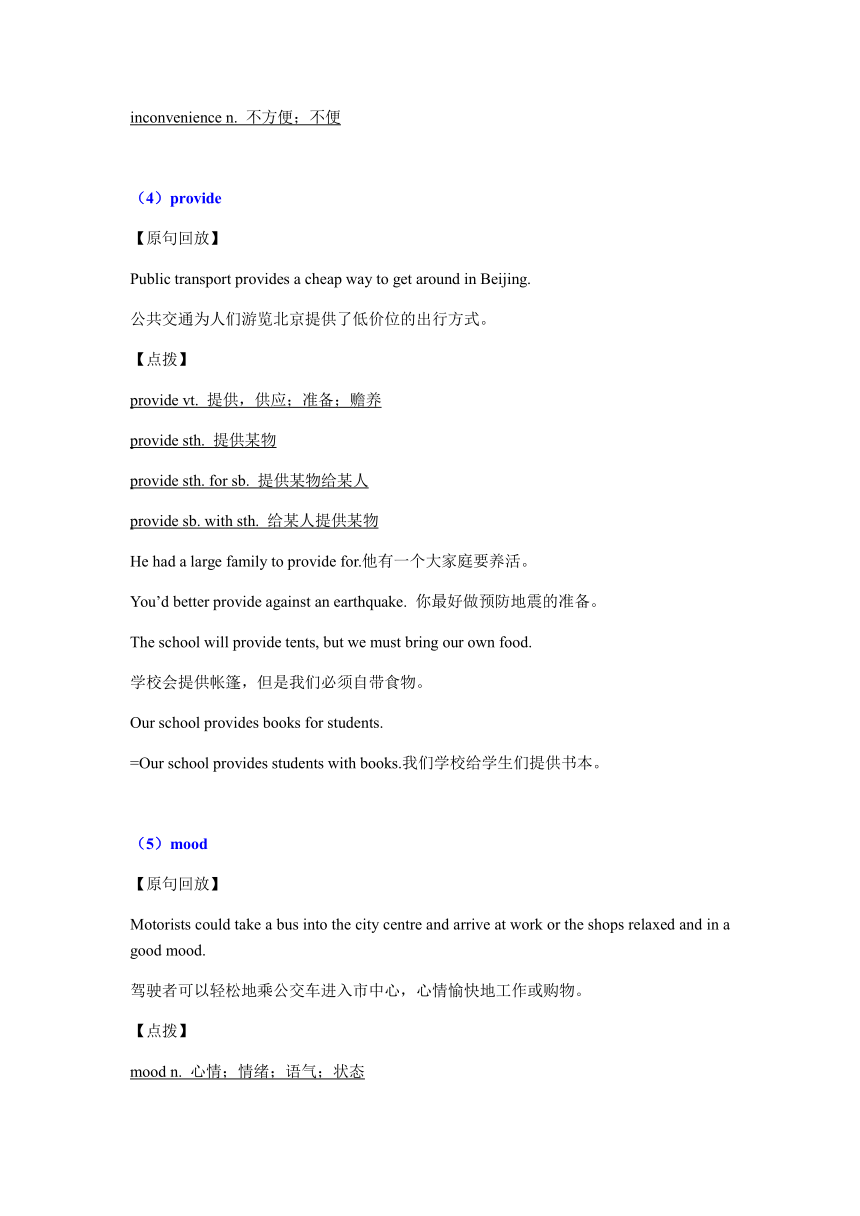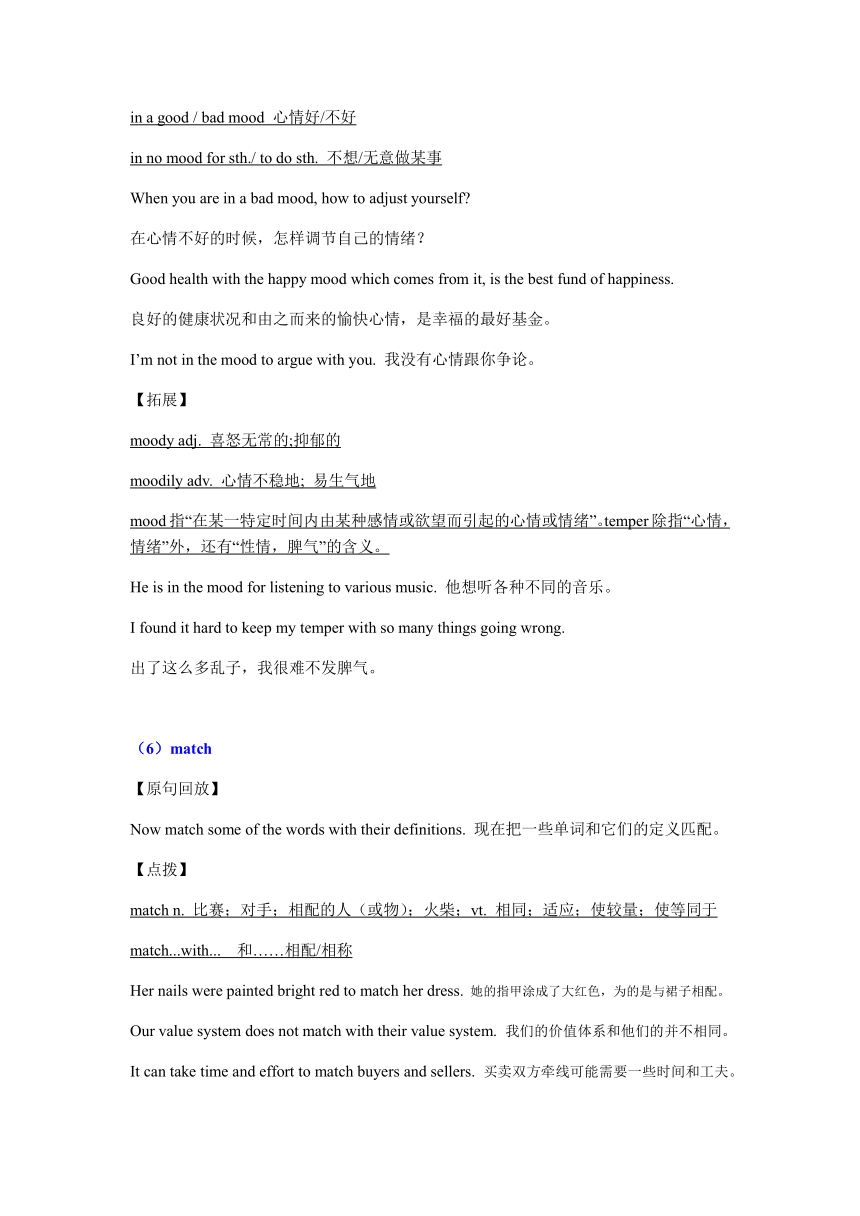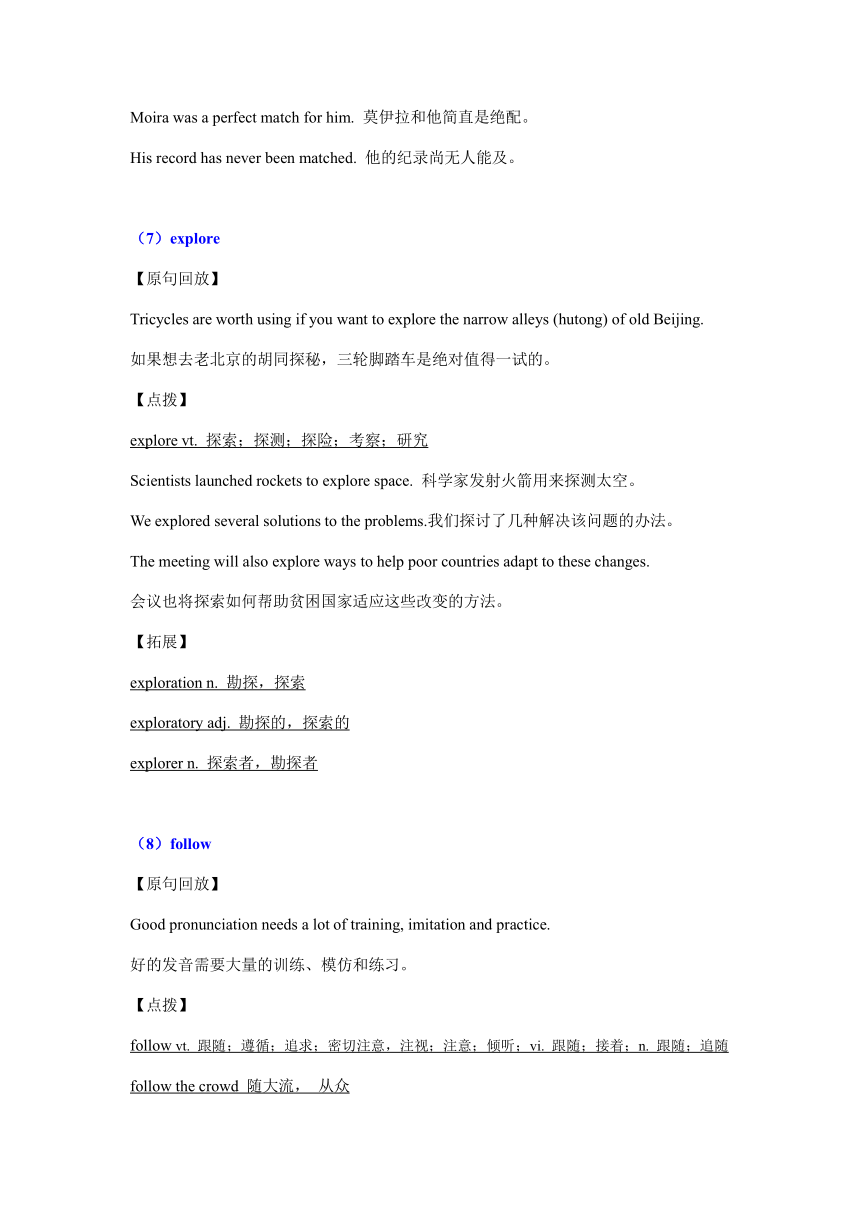外研版必修四Module 2 Traffic Jam知识点详析及练习(有答案)
文档属性
| 名称 | 外研版必修四Module 2 Traffic Jam知识点详析及练习(有答案) |

|
|
| 格式 | zip | ||
| 文件大小 | 61.5KB | ||
| 资源类型 | 教案 | ||
| 版本资源 | 外研版 | ||
| 科目 | 英语 | ||
| 更新时间 | 2020-02-20 21:40:09 | ||
图片预览





文档简介
重点单词详析:
(1)permit
【原句回放】
You should check the cab has a business permit, and make sure you ask for a receipt.
你应该确定司机有驾驶执照,而且一定要索要发票。
【点拨】
permit n. 允许,许可(常指成文的允许);通行证;许可证,执照;v. 许可,允许
permit sb. to do sth. 准许某人做某事
permit doing sth. 准许做某事
Weather permitting, …= If weather permits, …如果天气许可的话/假如天气好的话,……
Weather permitting, we’ll climb the mountain. 天气许可的话,我们就去爬山。
with/without one’s permission 在某人的允许下/未经某人的许可
Please permit me to say a few words. 请允许我说几句话。
It’s illegal to read people’s private letters without permission.
未经允许看别人的私人信件是不合法的。
【拓展】
permission n. 准许;许可;批准
ask for permission 请求许可
permit与allow都可以作“允许”解。permit强调权威性的正式批准,表示“允许、准许”;allow暗含默许、放纵之意,有并不禁止的含义,表示“容许”。
(2)limit
【原句回放】
Buses numbered 1 to 100 are limited to travel within the city centre.
公交线1到100路都是仅限于市中心内的。
【点拨】
limit n. 限度,限制范围;极限;vt. 限制(定)
a limit to/on 对……的限制
limit sth. to…/be limited to… 限制在……
I shall limit myself to three aspects of the subject. 我仅探讨这一问题的三个方面。
Each branch of the government has limited powers. 政府的每一个部门拥有有限的权力。
There’s no limit to what you can do if you try.如果你努力,没有什么你不能做的。
【拓展】
limited adj. 有限的;limitless adj. 无限的
(3)convenient
【原句回放】
Trains are fast and convenient, but rush hours can be terrible.
地铁方便快捷,但在高峰期情况会很糟糕。
【点拨】
convenient adj. 方便的;便利的
sth. be convenient for/to sb. 对某人来说……是方便的
at one’s convenience 在某人方便时
It is convenient for sb. to do sth.… 对某人来说做某事方便。
convenient的主语是it或其他的物,而不能用人。
I can’t see him now; it’s not convenient. 我现在不便见他。
Will it be convenient for you to start work tomorrow?你明天开始工作方便吗?
【拓展】
convenience n. 方便,便利;便利的事物、用具
inconvenient adj. 不方便的;不便利的
inconvenience n. 不方便;不便
(4)provide
【原句回放】
Public transport provides a cheap way to get around in Beijing.
公共交通为人们游览北京提供了低价位的出行方式。
【点拨】
provide vt. 提供,供应;准备;赡养
provide sth. 提供某物
provide sth. for sb. 提供某物给某人
provide sb. with sth. 给某人提供某物
He had a large family to provide for.他有一个大家庭要养活。
You’d better provide against an earthquake. 你最好做预防地震的准备。
The school will provide tents, but we must bring our own food.
学校会提供帐篷,但是我们必须自带食物。
Our school provides books for students.
=Our school provides students with books.我们学校给学生们提供书本。
(5)mood
【原句回放】
Motorists could take a bus into the city centre and arrive at work or the shops relaxed and in a good mood.
驾驶者可以轻松地乘公交车进入市中心,心情愉快地工作或购物。
【点拨】
mood n. 心情;情绪;语气;状态
in a good / bad mood 心情好/不好
in no mood for sth./ to do sth. 不想/无意做某事
When you are in a bad mood, how to adjust yourself?
在心情不好的时候,怎样调节自己的情绪?
Good health with the happy mood which comes from it, is the best fund of happiness.
良好的健康状况和由之而来的愉快心情,是幸福的最好基金。
I’m not in the mood to argue with you. 我没有心情跟你争论。
【拓展】
moody adj. 喜怒无常的;抑郁的
moodily adv. 心情不稳地; 易生气地
mood指“在某一特定时间内由某种感情或欲望而引起的心情或情绪”。temper除指“心情,情绪”外,还有“性情,脾气”的含义。
He is in the mood for listening to various music. 他想听各种不同的音乐。
I found it hard to keep my temper with so many things going wrong.
出了这么多乱子,我很难不发脾气。
(6)match
【原句回放】
Now match some of the words with their definitions. 现在把一些单词和它们的定义匹配。
【点拨】
match n. 比赛;对手;相配的人(或物);火柴;vt. 相同;适应;使较量;使等同于
match...with... 和……相配/相称
Her nails were painted bright red to match her dress. 她的指甲涂成了大红色,为的是与裙子相配。
Our value system does not match with their value system. 我们的价值体系和他们的并不相同。
It can take time and effort to match buyers and sellers. 买卖双方牵线可能需要一些时间和工夫。
Moira was a perfect match for him. 莫伊拉和他简直是绝配。
His record has never been matched. 他的纪录尚无人能及。
(7)explore
【原句回放】
Tricycles are worth using if you want to explore the narrow alleys (hutong) of old Beijing.
如果想去老北京的胡同探秘,三轮脚踏车是绝对值得一试的。
【点拨】
explore vt. 探索;探测;探险;考察;研究
Scientists launched rockets to explore space. 科学家发射火箭用来探测太空。
We explored several solutions to the problems.我们探讨了几种解决该问题的办法。
The meeting will also explore ways to help poor countries adapt to these changes.
会议也将探索如何帮助贫困国家适应这些改变的方法。
【拓展】
exploration n. 勘探,探索
exploratory adj. 勘探的,探索的
explorer n. 探索者,勘探者
(8)follow
【原句回放】
Good pronunciation needs a lot of training, imitation and practice.
好的发音需要大量的训练、模仿和练习。
【点拨】
follow vt. 跟随;遵循;追求;密切注意,注视;注意;倾听;vi. 跟随;接着;n. 跟随;追随
follow the crowd 随大流, 从众
follow the fashion 赶时髦
follow a middle course 采取折衷办法
follow on 继续下去
follow suit 跟着做
follow through 坚持到底
as follow 依下列各项
We followed him up the steps into a large hall.我们跟他上了台阶,进入一个大厅。
Other problems may follow.其它问题也许会随之而来。
What follows is an eye-witness account.接下来是目击者的陈述。
Go through the arch and follow the path. 穿过拱门沿小径往前走。
(9)suffer
【原句回放】
But even cities in developed countries such as the US suffer.
但是在一些像美国一样的发达国家的城市里交通阻塞现象也十分严重。
【点拨】
suffer vi. 受痛苦;受损害;变糟;变差;vt. 忍受;容忍;容许;遭受。
注意:suffer作“患病”讲时,后接from,有时接“with +疾病”;
作“受……苦”讲时,后接from;
作及物动词时,后常接不利的事做宾语,如loss, pain, hardship等抽象名词,但不用被动语态。
Can you assure me that my father is not suffering? 你能保证我父亲不会受罪吗?
He was eventually diagnosed as suffering from terminal cancer. 他最终被诊断出患了晚期癌症。
That company suffered a great loss.那家公司受到很大损失。
重点短语详析:
(1)be/get stuck in
【原句回放】
Have you ever been stuck in a traffic jam? 你曾经陷入交通堵塞中过吗?
【点拨】
be/get stuck in… 被困在……;卡住了,卡壳了,进行不下去了
She got stuck on the third question.她在第三个问题上卡住了。
The bus was/got stuck in the mud.汽车陷在泥里了。
【拓展】
get caught in 被困于;突然遭遇
Getting caught in a snowstorm is a terrible experience.被困于暴风雪是一次糟糕的经历。
(2)be (well) worth doing
【原句回放】
Tricycles are worth using if you want to explore the narrow alleys (hutong) of old Beijing.
如果想去老北京的胡同探秘,三轮脚踏车是绝对值得一试的。
【点拨】
be (well) worth doing (非常)值得做
be worth (钱数、代价、价值) 值……
worthwhile adj. 值得的
be worthy of 值得;配得上(不跟表示钱数的名词)
be worthy of doing/being done 值得做(某事)
be worthy to do/to be done 值得做(某事)
It’s worthwhile doing/to do sth. 做某事是值得的。
注意:
worth后面要加动名词的主动形式来表示被动含义,而be worthy of后的动名词及be worthy后面的不定式要根据实际情况用主动或被动形式。
The deed is worthy of praise. 这种行为值得称赞。
The watch isn’t worth that price.这个手表不值那个价。
(3)get around
【原句回放】
Say which means of transport you can use to get around your town.
说一说你能用哪种交通方式在你的城镇周围游览。
【点拨】
get around 四处走动;(新闻或消息)传开;解决
It quickly got around that Mark was back in town.马克回城的消息很快传开了。
The stranger lost his way and got around in the street.那个陌生人迷了路,在大街上四处游逛。
I don’t know how he’s going to get around that one.我不知道他打算如何处理此事。
【拓展】
get around/round/ about都可以表示“消息传开”,相当于不及物动词spread,常以“消息”等名词作主语。
get across 理解;明白
get on/along (with) 进展;相处
get over 结束;康复;克服
get down to (doing) sth. 开始认真做某事
get through 接通(电话);顺利通过(考试等)
get out of(使)逃避;避免;摆脱
get off 出发,离开;下班;下车
(4)under construction
【原句回放】
There are four underground lines in Beijing, and several lines are under construction.
北京有四条地铁线,还有几条正在建设之中。
【点拨】
under construction 在建设中
The new railway is still under construction.新铁路还在建设之中。
【拓展】
under与某些名词连用可表示“处于某种状态之中”。
under attack 遭受攻击
under repair 在修理中
under control 在控制之中
under discussion 在讨论中
under the leadership of 在……领导下
My bike is under repair. 我的自行车正在修理中。
Now the small country is under attack by several countries.
现在这个小国正在遭受几个国家的攻击。
(5)in no time
【原句回放】
Simply raise your hand, and a taxi appears in no time.
只要你招招手,马上会有出租车开过来。
【点拨】
in no time 马上;一会儿
He finished off two bowls of chicken noodles soup in no time.他很快吃完了两碗鸡汤面。
【拓展】
at one time 曾经;一度
at a time 每次;一次
at all times 总是;随时;永远
at times 有时;间或
from time to time 不时;有时;偶尔
at the same time 同时
in time 及时;迟早;最后,终于
on time 按时;准时
of all time 自古以来;从未有过
(6)have a good view of
【原句回放】
You’ll have a good view of the rapidly changing city.
你会一览这个飞速发展城市的亮丽风景。
【点拨】
have a good view of 清楚地看到
We can have a good view of the village from here. 我们从这能清楚地看到村子的景色。
From their own operations in China, they have a good view of what the Chinese are up to.
这些公司通过自己在中国的企业,很好地了解中国在做什么。
【拓展】
at first view 初看
come into view 进入眼帘
重点句型详析:
(1)Why not...?
【原句回放】
Why not build more underground lines? 为什么不铺设更多的地下铁路呢?
【点拨】
why not ...? 为什么不……?
Why not do ...? = Why don’t you do ...? 这两个句型都用来表示提出忠告或建议,前者是后者的省略形式,前者用省略to的不定式,后者是完整的否定疑问句。
Why not?也可单独使用,表示“为什么不行?(反问,不赞同)”“好啊!”“请(同意,赞同)”。
另外,Why do ...?也可用来表示“责备或指责”,表示没有必要或没有意义。
It looks like to rain. Why not take a raincoat?天像要下雨了。你为什么不带件雨衣呢?
Since you have to stay at home, why don’t you do some reading?
既然你必须待在家里,为什么不读点书呢?
—You shouldn’t go out with me.你不该跟我出去。
—Why not?为什么不行?
Why argue with him? He’ll never change his mind.
为什么要和他争论?他永远也不会改变主意的。
(2)祈使句
【原句回放】
Simply raise your hand, and a taxi appears in no time.
只要你招招手,马上会有出租车开过来。
【点拨】
本句为“祈使句+and/or +简单句”结构。句型中的祈使句表示条件。祈使句表示请求、命令、叮嘱、邀请、劝告等,分为第二人称祈使句及第一、三人称祈使句。第二人称祈使句以动词原形开头,或在动词原形之前加do/don’t。
Be careful next time!下次小心!
(Do)Come back early!(一定)早点回来!
Don’t be nervous! 别紧张!
Never be late again! 千万别再迟到了!
第一、三人称祈使句常以let开头。
Let’s (not) have a rest.咱们(别)休息吧。
祈使句委婉的句型:Will you/ would you/ could you +原形……
Would you do me a favor?请帮个忙好吗?
巩固练习
一、完成短语
1. be connected _____ 与……相连
be_____ connection with与……有关
connect... ________...把 ……接到……上
2. be/get _____ in被困在
stick _______坚持
stick out ________ 坚持要求
3. ___ no time 立刻;马上
______ good/perfect time (表)走时很准
___ all time 有史以来
4. get _______ 四处走动
get _____ from偏离(主题);摆脱
get ________ 通过(法律等);经历
5. switch ___ 关掉
switch __ 打开
switch ____ (from/to)完全转变
6. keep _____ 保持冷静
keep ______小声点
keep you _____ 保持冷静
7. no ____ 没门儿
no ________ 没问题
8. ____ hour交通高峰期
rush sb. _______ doing sth. 催促某人做某事
rush ____________ 匆匆忙忙
_________ a rush匆匆忙忙
9. _____ construction正在建设中
under _______ 在控制之中
______ treatment在治疗中
10. be ______ a good mood心情好
be in _______ mood to do sth.不想做某事
____ sb. in a good mood使某人心情愉快
二、根据提示完成句子
1. They are usually red, and they _______________. (窗玻璃上陈列着每公里的价格标签)
2. You should check the cab has a business permit, and ____________. ( 一定要索取发票)
3. Public transport provides _____________________________. (廉价周游北京的方式)
4. However, there is also a night bus service, ______. (由编号在200到300之间的提供的)
5. Minibuses with seats for 12 passengers ___________. (提供了一种可以代替昂贵的出租汽车和拥挤的大型公交车的替代物) in some area.
6. 那本书顶多值5元钱。That book ____________ 5 Yuan at most.
7. 他口渴得很,把牛奶一饮而尽。He was very thirsty and drank his milk ___________.
8. 莎士比亚不仅是个作家,而且是个演员。Shakespeare was ______ a writer ____ an actor.
9. 他的绘画正在展览会上展出。His paintings are _________________ at the exhibition.
10. 这位老太太不允许(别人)在她家里吵闹。The old lady doesn’t _____ in her house.
11.如果这个消息传开了,记者们会整天给我们打电话的。
If this news_______________, we’ll have reporters calling us all day.
12.你能不能在你方便时给我来个电话,安排见一次面?
Can you telephone me___________________________ to arrange a meeting?
13. 如果身上带着钱,你可以买你喜欢的任何东西。
____________________there is money on you, you can buy whatever you like.
14.他未经许可就进入房间。He entered the room _____________________.
15. 她的早餐只限于面包和水。Her breakfast _________________ bread and water.
三、单项选择
1.—Let’s invite Li Dong to go with us, OK?
—________ The more, the happier.
A. Why not? B. No way! C. So what? D. How come?
2. Mary and I took a taxi to go home from Jane’s 33 birthday party last night and we shared the ____.
A. money B. fare C. receipt D. fine
3. The bus got ________ in the snow and we had to walk the rest of the way.
A. to be stuck B. stick C. stuck D. sticking
4.—How can I improve my spoken English?—I suggest you________ English every day.
A. practice speaking B. to practice to speak
C. will practice speaking D. practicing to speak
5.Will you drop in at my house this afternoon if ________?
A. it is convenient for you B. you are convenient
C. it is convenient of you D. you still be convenient
6. Smoking does great harm to our health. ________ is smoking allowed in public places.
A. At no time B. In no time C. At all times D. All the time
7. It’s the first time that the works of the paper cut ________ to the public.
A. have displayed B. were displayed
C. displayed D. have been displayed
8.—How did your mother react ________ the news?—She reacted by getting very angry.
A. with B. to C. in D. of
9.—Is there any________ to the time that I stay here?
—Yes, you must leave here before he comes back.
A. number B. length C. limit D. matter
10. When you came, I was trying to find the ________ to the problem that we were short of seats for so many people.
A. way B. solution C. step D. place
11. Two old men were playing chess in the park with trees ________ shade.
A. providing B. provided C. to provide D. provide
12. The building ________, for which all the villagers collected money, is an animal lab.
A. under construction B. sets up C. without destination D. puts up
13. We shouldn’t ignore what happens ________ it is difficult for us to accept some facts.
A. even if B. as if C. on condition that D. seeing that
14. Every ton of this recycled paper uses 90 liters of water in its ________.
A. structure B. manufacture C. construction D. organization
15. He said he would ________me to Professor McRae as his postgraduate student.
A. comment B. suggest C. command D. recommend
四、完形填空
Even though it was only October, my students were already whispering about Christmas plans. With each passing day everyone became more ___1__ waiting for the final school bell. Upon its __2__ everyone would run for their coats and go home, everyone except David.
David was a small boy in ragged clothes. I had often ___3__ what kind of home life David had, and what kind of mother could send her son to school dressed so ___4___ for the cold winter months, without a coat, boots, or gloves. But something made David 5 . I can still remember he was always ___6___ a smile and willing to help. He always ___7___ after school to straighten chairs and mop the floor. We never talked much. He ___8__ just simply smile and ask what else he could do, then thank me for letting him stay and slowly ___9___ home.
Weeks passed and the ___10__ over the coming Christmas grew into restlessness until the last day of ___11___ before the holiday break. I smiled in __12___ as the last of them hurried out the door. Turning around I saw David __13___ standing by my desk.
“I have something for you,” he said and __14__ from behind his back a small box __15___ it to me, he said anxiously, “Open it.” I took the box from him, thanked him and slowly unwrapped it. I lifted the lid and to my __16___ saw nothing. I looked at David’s smiling face and back into the box and said, “The box is nice, David, but it’s __17___.”
“Oh, no, it isn’t,” said David. “It’s full of love. My mum told me before she died that love was something you couldn’t see or touch unless you know it’s there.”
Tears filled my eyes ___18___ I looked at the proud dirty face that I had rarely given ___19___ to. After that Christmas, David and I became good friends and I never forgot the meaning __20__ the little empty box set on my desk.
1. A. anxious B. courageous C. serious D. cautious
2. A. warning B. ringing C. calling D. yelling
3. A. scolded B. wondered C. realized D. learned
4. A. modestly B. naturally C. inaccurately D. inappropriately
5. A. popular B. upset C. special D. funny
6. A. expressing B. delivering C. wearing D. sharing
7. A. practised B. wandered C. studied D. stayed
8. A. would B. should C. might D. could
9. A. aim at B. turn to C. put off D. head for
10. A. argument B. excitement C. movement D. judgment
11. A. school B. year C. education D. program
12. A. relief B. return C. vain D. control
13. A. weakly B. sadly C. quietly D. helplessly
14. A. searched B. found C. raised D. pulled
15. A. Holding B. Handing C. Sending D. Leaving
16. A. delight B. expectation C. appreciation D. surprise
17. A. cheap B. empty C. useless D. improper
18. A. as B. until C. because D. though
19. A. advice B. support C. attention D. command
20. A. from B. behind C. over D. towards
答案与解析
一、完成短语
1. to; in; to/with 2. stuck; to; for 3. in; keep; of
4. around; away; through 5. off; on; over 6. cool; quiet; head
7. way; problem 8. rush; into; about/around; in
9. under; control; under 10. in; no; put
二、根据提示完成句子
1. display the price per kilometer on the window
2. make sure you ask for a receipt
3. a cheap way to get around in Beijing.
4. provided by buses with a number in the 200s.
5. offer an alternative to expensive taxis and crowded public transport
6. is worth
7. in no time.
8. not only; but also
9. on display
10. permit making noises
11. gets around
12. at your convenience
13. Provided that
14. without permission
15. was limited to
三、单项选择
1. A。why not“为什么不呢”;no way “没门儿”;so what “那又怎样”;how come “为什么呢”。上句意为“我们邀请李东和我们一起去吧,怎么样?”根据答语后句“人越多,越开心”,可知选A。
2. B。fare “车费”;money “钱”;receipt “收据”;fine “罚款”。根据句意“我和玛丽一起从简的33岁生日晚会乘出租车回家,我们平摊车费”,可知选B。
3. C。句意:汽车陷入了雪中,我们不得不步行走完剩下的路程。get stuck in 陷入,困入……。
4. A。句意:—我怎么样才能提高我的英语口语?—我建议你每天练习讲英语。suggest “建议”其后的宾语从句为虚拟语气,而 practice 后跟 doing 作宾语。
5. A。句意:如果你方便的话,今天下午能来我家吗?convenient 的主语不能是人,可排除B、D两项;it is convenient for sb. 对某人来说方便。
6. A。句意:吸烟有害健康。所以在公共场合决不允许吸烟。at no time 决不;in no time 立刻;at all times 总是;all the time 一直。at no time 放在句首时,句子要用部分倒装。
7. D。句意:这是剪纸作品第一次被展示给公众。It’s the first time that... 为固定句型,从句用现在完成时,剪纸作品被展示需用被动语态,所以D项正确。
8. B。句意:—你妈妈对这个消息的反应怎样?—她非常生气。react to “对(情况、行动、影响等作出的)反应,回应”。
9. C。考查固定搭配。句意:我呆在这里的时间有没有限制?limit作“限定,限制”讲时,后与介词to连用。
10. B。句意:当你来时,我正试图找到办法来解决没有供这么多人坐的座位的问题。solution “解决问题的办法”,符合题意。
11. A。本题考查 with 复合结构。provide 意为“提供”,trees 与 provide 之间是主动关系,因此用V-ing 形式。句意:两位老人正在公园的树阴下面下棋。
12. A。句意:全体村民集资的正在建造的大楼是一座动物试验室。under construction 处于建设中。
13. A。even if (即使)在此引导让步状语从句。as if “好像”;on condition that “条件是……”;seeing that “鉴于”。
14. B。句意:每生产一吨这种再生纸要使用90升水。structure“结构”;manufacture“生产”;construction“建造”;organization“组织”。
15. D。comment“评论”;suggest“建议”;command“命令,指挥”,都不合题意。句意:他说他愿意把我推荐给McRae教授作他的研究生。recommend“推荐”,故D项符合。
四、 完形填空
1. A。每一天,学生们都更急切地等着放学铃声的响起。anxious渴望的,急切的,符合语境。courageous勇敢的,无畏的;serious严肃的;cautious小心的,谨慎的。
2. B。上句提到“等候放学铃响”,这里当然应是ringing与bell照应。warn警告;call叫,喊,打电话;yell叫喊,嚎叫。故答案为B。
3. B。由语境可知作者在此表示自己的迷惑和不解,即“我经常想知道他过着一种怎样的家庭生活”,用wonder表示“对……感到疑惑,想知道”。scold指责,批评;realize意识到;learn学会,了解,故答案为B。
4. D。由空后的冬天没有大衣、靴子、手套可知,这里表示什么样的母亲能让儿子穿得如此不恰当地到学校。inappropriately“不适当,不合适地”,符合语境。modestly谨慎地,适当地;naturally天然地,表现自然地;inaccurately有错误地,不正确地。
5. C。由上下文的转折关系可知这里意为“但是某些东西让David与众不同”。special“特殊的”,符合语境。popular受欢迎的;upset难过的;funny有趣的。
6. C。wear a smile面带笑容,为固定搭配。express表达;deliver交付,递送;share分享。
7. D。由语境可知,他常常放学以后“留在”教室里整理椅子并用拖把擦地板,故D项stayed符合语意。practise练习;wander漫游,徘徊;study学习,都与语境不符。本段最后一句也有提示。
8. A。would可以表示过去经常发生的或反复做的动作,符合句意。他常常只是笑笑,问还能做些什么。
9. D。由语境可知他应是回家,故D项head for合适,意思是“朝……进发”。aim at瞄准;turn to(把注意力等)转向,求助于;put off延期。
10. B。孩子们对即将到来的圣诞节的“兴奋感”一直持续到放假前的最后一天,excitement“兴奋”,符合语境。argument争论;movement运动;judgment判断。
11. A。根据句意和上下文可知此处说的是学生们假期前在“学校”的最后一天,故A合适。year年;education教育;program程序,计划。
12. A。当最后一个学生走出(教室)门时,我放松地笑了。故选A,in relief表示“放松”。in return作为回报;in vain白费地,无用地;in control在控制之下。
13. C。转过头,作者发现David站在桌子旁,而作者之前并没意识到David的存在,所以C项最为合适,表示“静静地”。weakly软弱地,无力地;sadly悲哀地,令人惋惜地;helplessly无能为力地,无助地。
14. D。从句意可知,他从背后拿出了一个小盒子。search搜查;find找到;raise提高,举起;pull把……拉(过来),把……扯(过来)。显然只有D项符合句意。
15. B。由语境可知,他应该是一边把盒子“递给”作者一边急切地说,故选B,hand...to...意思是“把……递给……”,符合语境。hold抱;send送,寄,派;leave留下,遗留,都与所给语境不符。
16. D。看到盒子里什么都没有,“我”当然应该是“惊讶”了,故D项surprise合适,to one’s surprise表示“令人惊讶的是”。delight快乐,高兴; expectation预料,期望;appreciation欣赏,赞赏。
17. B。显然,“我”说的是“盒子很好,但它是空的”,也与上文的“saw nothing”相照应,故答案为B,empty表示“空的”。cheap便宜的;useless无用的;improper不适当的。文章最后一句也有提示。
18. A。句意为“当我看着那张我很少给予关注的自豪的脏兮兮的小脸时,泪水充满了我的眼睛”。此处as引导时间状语从句,表示“当……时”。until表示动作一直持续到某个时间;because引导原因状语从句;though引导让步状语从句,与句意不符。
19. C。由句意可知,作者在说自己原来很少关注他。give attention to表示“注意……;留心……”,符合语境。advice建议;support支持;command命令,指挥。
20. B。“我”永远忘不了隐藏在我桌子上的这个小空盒子背后的意思。behind被……遮挡,隐藏在……后面;在……幕后,在……背后,符合语境。
